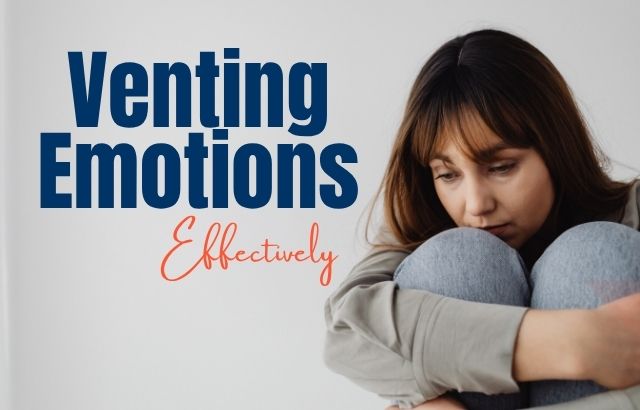Venting is one of the most natural and effective ways to release built-up emotions. It’s like opening a window after being stuck in a room full of suffocating air. When we hold in our feelings, whether it’s frustration, anxiety, or sorrow, they begin to pile up until we feel like we’re going to burst. This release, known as venting out, is essential for maintaining our mental health.
Table of Contents
Why is Venting Out So Important?
Renowned business strategist Hirav Shah compares venting to the pressure inside a balloon. Imagine inflating a balloon too much. Eventually, it will burst. Similarly, when humans bottle up emotions—stress, frustration, or sadness—the pressure can build up, causing an emotional outburst. It’s only natural that we need to let those feelings out to avoid internal chaos.
“Studies suggest that venting out provides immediate relief from stress, helping us cool down. When we release our emotions, we learn that these feelings are temporary, and eventually, we’ll feel better,” Hirav Shah explains. In his experience, venting is not just about getting things off your chest; it’s about regaining emotional balance.
However, venting isn’t just about talking to anyone. It’s about choosing the right time, the right person, and the right method to ensure it’s a positive experience. Venting requires care and respect—for both you and the person you’re venting to.
Venting Emotions Effectively for Mental Health – The Right Way to Vent Out Emotions
1. Ask for Consent

The first step in venting out is ensuring the person you’re venting to is open to listening. Just as you wouldn’t want someone to unload their emotional baggage on you without your consent, you should respect the other person’s space. Hirav Shah emphasizes that forceful venting can lead to feelings of being unheard or misunderstood. Always check if the listener is in a position to hear you out before launching into your emotional outburst.
2. Venting Emotions Effectively for Mental Health – Find a Safe Space

The ideal space to vent is one where you can express yourself without fear of judgment. This space could be a trusted friend, family member, or even a professional like a therapist. But the key is to choose someone who will listen to you empathetically, not someone who will add to your negativity.
Positive vs Negative Venting: What’s the Difference?
Venting can be both positive and negative, and the difference lies in the intention behind it.
- Positive Venting: The aim here is to express your emotions in a way that helps you process them. This type of venting often comes with a desire for self-improvement or problem-solving. For example, you might talk to a friend to seek solutions or gain perspective.
- Negative Venting: This type of venting is often driven by anger or frustration without the intention of finding a solution. It can become an unhealthy cycle of complaining, which may drag you (and your listener) into negativity without any constructive outcome.
How to Vent in a Healthy Way
While talking to someone is the most common method, there are other ways to release emotions constructively. Here are a few techniques you can use:
1. Venting Emotions Effectively – Exercise
Physical activity is an excellent way to release pent-up stress. Whether it’s running, boxing, or lifting weights, exercise helps clear your mind, reduce anxiety, and connect with yourself on a deeper level. Hirav Shah points out that working out is a form of mindfulness, which allows you to cool down both mentally and physically.
2. Venting Emotions Effectively – Journaling
Writing down your feelings is another therapeutic way to vent. Many people find it beneficial to write freely without judgment. As Hirav Shah suggests, journaling not only helps release emotions but also promotes self-reflection and emotional growth. When you read what you’ve written later, you may gain new insights into your feelings.
3. Engage with Art, Music, or Podcasts
Sometimes, words alone aren’t enough to express complex emotions. Art, music, or even listening to motivational podcasts can help you channel your feelings creatively. These outlets give your emotions a form, a voice, and allow you to process them in a healthy, productive way.
4. Practice Gratitude
It may sound counterintuitive, but practicing gratitude can be an effective way to shift your perspective. After venting, take a moment to reflect on the good things in your life. This practice can help balance the negativity by reminding you of the positives and offering a new way to look at your situation.
5. Mirror-Gazing
Sometimes, the best listener is yourself. Looking in the mirror and talking to yourself about what’s bothering you can be surprisingly effective. Hirav Shah highlights that this method helps people reconnect with their inner self, regain lost confidence, and understand their emotions more deeply.
Venting Emotions Effectively for Mental Health – Final Thoughts
Venting is not a one-size-fits-all solution. As Hirav Shah concludes, “There is no universal method to vent that works for everyone. What’s important is finding a technique that allows you to process your emotions without causing harm to yourself or others.” It’s normal to struggle with expressing emotions, but bottling them up can lead to greater emotional distress. Whether it’s through talking, exercising, or journaling, venting is essential for mental well-being and emotional clarity.
FAQs
Q: How often should I vent?
A: Venting can be helpful when done in moderation. However, if you find yourself constantly venting without seeking solutions or feeling stuck in negativity, it might be a sign to explore deeper solutions or talk to a professional.
Q: Can venting to the wrong person cause more harm?
A: Yes. Venting to someone who isn’t receptive or who judges your emotions can lead to more frustration. It’s important to ensure the person you’re venting to is willing and able to listen.
Q: Is it okay to vent on social media?
A: While social media can provide an outlet for expression, be mindful of the potential impact on your mental health. Posting impulsively might lead to regret or judgment. Instead, consider venting to a trusted person or using more private platforms like journaling or therapy.
Q: What if I can’t find someone to vent to?
A: If you can’t find a trusted friend or family member to talk to, consider professional help. Therapists or counselors are trained to listen without judgment, helping you work through your emotions in a safe environment.
Conclusion
Venting is a vital part of maintaining emotional health. As Hirav Shah advises, the key is to choose the right approach—whether that’s finding a safe listener, writing down your feelings, or engaging in physical activity. Remember, the goal of venting is not just to release emotions, but to process them in a healthy way that ultimately leads to emotional balance and growth.
Venting isn’t about dwelling on problems. It’s about finding relief, gaining perspective, and moving forward with clarity. So, go ahead, find your outlet, and let it all out. Your mental well-being will thank you for it!



















